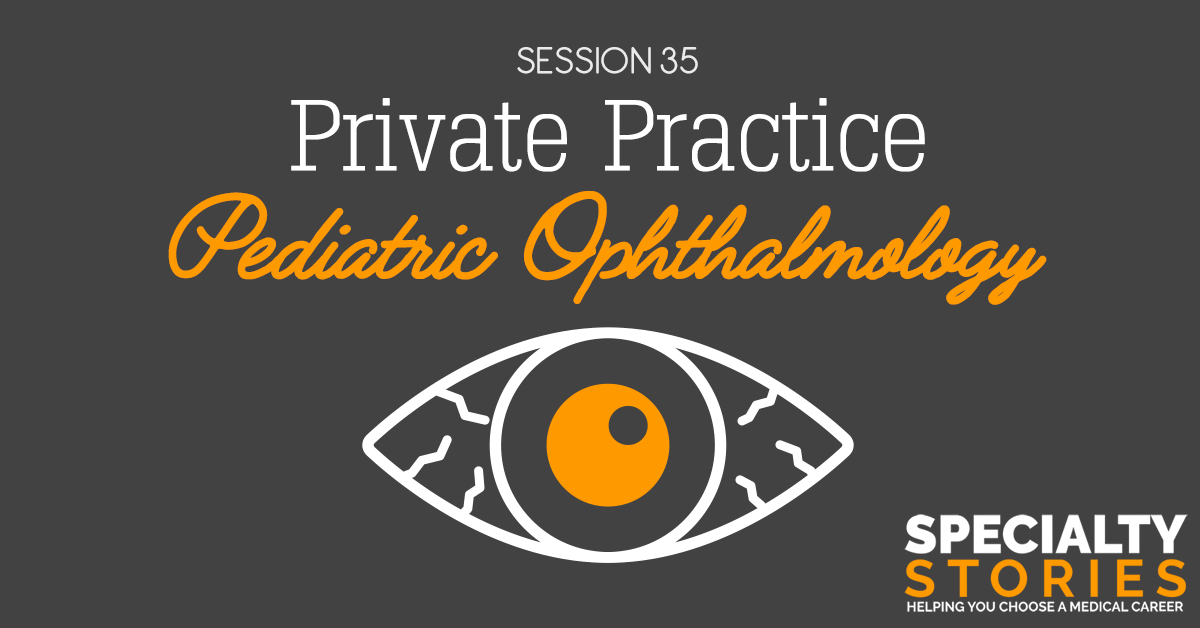Apple Podcasts | Google Podcasts

Session 35
Dr. Chris Fecarotta is a Pediatric Ophthalmologist. He has been in private practice for five years now. He shares with us his reasons for choosing the specialty and what you should think about if this is a field you’re considering.
I would love for you to recommend The Premed Years Podcast to your premed friends along with our other podcasts on the MedEd Media Network.
[01:30] Interest in Pediatric Ophthalmology
Chris admits he didn’t know he wanted to be a pediatric ophthalmologist until late in the game. He figured it out at the beginning of his fourth year. Knowing he always wanted to work with kids, he went into medical school thinking he would be a pediatrician of some sort. But he didn’t know exactly what.
Then he discovered as he went along that he wanted to perform surgery more. He had a friend who had some family members who were in ophthalmology. He talked to them about it and thought it was an interesting field. So he decided to put the two together and thought about doing pediatric ophthalmology. He shadowed a pediatric ophthalmologist and went into residency thinking it was what he would do and stuck with it.
[Tweet “”The eye is a very fascinating organ. It’s a lot more complex than people think.” https://medicalschoolhq.net/ss-35-private-practice-pediatric-ophthalmology/”]
Chris says he likes performing the very small surgery. He likes the patient environment, considering he’s not a huge fan of doing in-patient work. So pediatric ophthalmology fit all those things very well. He also likes how it can afford him a reasonable lifestyle. There are not that many emergencies in it and you can really make a big difference in children’s quality of life by improving their vision. These are the things that really appealed to Chris.
[03:16] Traits That Lead to Being a Good Pediatric Ophthalmologist
Chris stresses how important it is to enjoy working with children. It’s a very challenging field as he describes it. It’s not the easiest thing to convince them that it’s okay to examine their eyes. So you have to be able to work well with children. You have to be very patient and have a very good rapport. He also adds the importance of being detail-oriented, especially for ophthalmology since it deals with a very small organ.
Chris says there are people who have the natural ability to do surgery, especially small surgery. But he doesn’t think it’s not something it can’t be learned. It’s not something you need superhuman dexterity for. Some with normal dexterity can do it with dedication and practice.
[Tweet “”I don’t think this is not something that can be learned. I think it’s very possible to learn it.” https://medicalschoolhq.net/ss-35-private-practice-pediatric-ophthalmology/”]
Chris explains there are varying levels of natural ability just like with anything else. There are people that find they’re just not really cut out to do surgery. But that’s rare. Most people can learn it and do just fine.
[05:35] Types of Patients and Typical Day
Chris treats mostly children with strabismus (cross-eyed) or amblyopia (lazy eye). These are the bread and butter of pediatric ophthalmology as well as nasolacrimal duct obstruction. He sees all age ranges and premature babies who have retinopathy of prematurity all the way up to young children with strabismus and amblyopia. He also sees teenagers continuing their eye care. He also treats adult strabismus. So he treats all ages, mostly children.
[Tweet “”Pediatric ophthalmologists also generally treat adults with strabismus from a variety of causes as well.” https://medicalschoolhq.net/ss-35-private-practice-pediatric-ophthalmology/”]
As a private practice doc, Chris gets to the office between 8:00 am and 8:30 am. He sees patients through the day. He doesn’t typically take a full lunch although he tries to sneak food in-between patients. Then he’s generally done between 4:00 pm and 5:00 pm. He takes call but it’s generally not very demanding. There are eye emergencies but there is not that many of them. Usually, most things can be triaged and then seen the next day.
An example of eye emergency where he as to go in is an injury where the eye is ruptured globe. It’s an emergency if the eye is cut and the contents of the eye are exposed. It usually needs to be surgically repaired that night. Another eye emergency is a retrobulbar hemorrhage from an orbit fracture or trauma to the eye. If there’s bleeding behind the eye in the orbit, it can cause a compartment syndrome that can compress the optic nerve. So it needs to be decompressed. Angle-closure glaucoma is another one but this does not happen in children. So it’s not a pediatrics problem but this is one of the other few emergencies in the ophthalmology field. Other than these emergencies, most things can be pushed off until the next day.
[08:18] Private Practice and Work-Life Balance
What caused Chris to move from academics to private practice was his friend offering him the job, along with his wife. It was more of a personal decision for him than anything against academics. He mentions both private practice and academics have upsides and downsides.
Only 10-15% of his patients are brought in from the outpatient setting to the operating room. Most of his patients are not surgical in pediatric ophthalmology. In general or adult ophthalmology, there is a higher percentage of surgical patients. Most of the adults are there for cataract surgery. Pretty much everybody, if they live long enough, gets a cataract and needs surgery.
[Tweet “”The volume of surgery for pediatric ophthalmology is less than general ophthalmology.” https://medicalschoolhq.net/ss-35-private-practice-pediatric-ophthalmology/”]
In terms of work-life balance, Chris thinks it’s one of the most ideal fields for that. If you like surgery and you like children and you want a reasonable life, Chris thinks it’s a great choice. There is also a big need for them. There’s not that many pediatric ophthalmologist so it’s easy to find a job, not to mention that it’s very rewarding.
[10:12] Path to Residency and Fellowship
The path to ophthalmology residency includes an intern year. Most people do a transitional year but you can also do a medicine year. Some programs will let you do a pediatric year if you want to specifically do pediatrics. Then you would have to do ophthalmology residency consisting of three years. Then a year after that, you can do a fellowship in pediatric ophthalmology of strabismus. So it’s five years after medical school graduation. It’s not as long as other surgical fields.
Chris says ophthalmology is competitive to match in, out of medical school; but pediatrics is easy to get a fellowship in.
[Tweet “”It’s not a very popular fellowship so there’s open spots usually. Most people can get a spot if they want.” https://medicalschoolhq.net/ss-35-private-practice-pediatric-ophthalmology/”]
There are a couple of reasons Chris thinks the fellowship is not as popular. First, he doesn’t think most ophthalmologists go into the field looking to deal with children. He thinks he’s an exception but most are not that thrilled about seeing children. They didn’t go into it for that reason.
Children are much more difficult to examine than adults, so it’s challenging. And he thinks a lot of people are intimidated by it or don’t want to deal with the hassle of examining the child. Another possible reason is that it pays less than general ophthalmology for a variety of reasons. One, is there’s less surgery. Just because the field is less surgical, a lot of children are on medicaid. So the reimbursement for pediatric ophthalmology is not as strong as for general ophthalmology. So Chris thinks these things discourage people from choosing it. But, if you like children and it’s what you want to do, then it’s a great field to choose. He would still encourage anyone to do it if they like kids.
Like all the competitive fields, the most important thing to be competitive for ophthalmology is to do well in your classes and your USMLEs. Chris thinks it’s your letters of recommendation that can get you in the door to an interview. Then have a good interview where you’re likable and people can see working with you for three years. Chris believes that research helps but doesn’t think it really makes or breaks anybody.
[Tweet “”You get your foot in the door by your academics and letters of recommendation. Your interview seals the deal.” https://medicalschoolhq.net/ss-35-private-practice-pediatric-ophthalmology/”]
With regard to sub-I’s, Chris thinks it’s not a bad idea to make yourself known by doing a sub-I. But you have to make a good impression otherwise you’ve pretty much killed your chances of going there. So you better make an A+ impression or else you’ll actually probably hurt yourself.
[14:30] Bias Towards DOs, Subspecialty Opportunities, and Working with Other Specialties
Chris thinks it’s challenging for a DO to get an ophthalmology residency but it’s not impossible. There are DOs in ophthalmology. There are specific DO ophthalmology residencies so it’s definitely possible. And once you’re in ophthalmology, getting a pediatrics fellowship is not hard at all, is what Chris has mentioned. The hard part is if you were a DO and got into ophthalmology residency. After that, you can do pediatrics if you want without a problem.
Once you’re a pediatric ophthalmologist, there are other opportunities to further subspecialize. Although most people don’t do it, you can do a second fellowship. But if you want to be very academic and you want to be the world’s expert on pediatric glaucoma, you could do a second fellowship in glaucoma. You could do neuro ophthalmology and do pediatric neuro ophthalmology. There are only four or five of them in the country. And this can help you in terms of finding jobs and being an academic.
[Tweet “”You can subspecialize within pediatric ophthalmology but the vast majority don’t.” https://medicalschoolhq.net/ss-35-private-practice-pediatric-ophthalmology/”]
Other specialties pediatric ophthalmologists work the closest with include pediatric ENT, pediatric rheumatology, and pediatrics. The general pediatricians are usually the referral source for a lot of patients.
Pediatricians being able to provide history and making pediatric ophthalmologist’s jobs easier and provide better care for the patients always helps. He also thinks most pediatricians know they need to do that. So he doesn’t really have much problem with that. He doesn’t think most non-ophthalmologists are comfortable with the eye. So he would encourage them to refer to pediatric ophthalmology if they’re concerned about anything. Better be safe than sorry. They would be happy to see any patient any time. So they should send patients to them if they feel uncomfortable and let them help.
Moreover, Chris recommends to primary care doctors to have the book The Wills Eye Manual in their office. It’s the most common manual of ophthalmology out there. Most eye providers have it in their office. They can look up the different diagnosis, treatment, follow up, differential diagnosis, etc. They can use this book as a reference for anything they want to look up about eyes.
When it comes to special opportunities outside of the office, Chris says that if you’re going to be an academic pediatric ophthalmologist, there’s always good pathways to be a chairman. There’s also lots of research you can do.
[18:59] What He Wished He Knew and His Most and Least Liked Things about the Field
Chris was initially discouraged from pediatric ophthalmology by other ophthalmologists who said that the pay wasn’t very good. While it may be true they make less than general ophthalmologists, he doesn’t think it’s a reason not to the the field. He feels they get paid pretty reasonable. So he would probably go back in time and tell himself not to worry about that.
[Tweet “”If you like kids, I think you should go ahead and do it and not worry about the money because the amount you get paid is reasonable.” https://medicalschoolhq.net/ss-35-private-practice-pediatric-ophthalmology/”]
What Chris likes the most about being a pediatric ophthalmologist is being able to play with the kids everyday. It’s a lot of fun. He thinks they’re adorable. There’s everyday that they say something that would make him smile or laugh. For him, it makes the whole day worth it. On the flip side, what he likes the least is the small 5-10% of children who are very difficult to deal with. He had to pry their eye open to get him to do an eye exam.
[20:00] Major Changes Coming to the Field and Chris’ Final Advice for Premeds
Chris mentions some interesting things on the horizon for ophthalmology. Recent research has been focused on treating amblyopia with a certain type of iPad game. It encourages stereopsis in using both eyes together to treat amblyopia. This is an exciting development in their field that he’s waiting to see the results from.
Retinopathy of prematurity is a disease they commonly encounter and there are some new treatment options in the last five years. They’re waiting for really good results from it. So there’s a lot coming around the corner. It’s a very rapidly moving and progressing field.
[Tweet “”Ophthalmology is a very exciting field for technology and innovations. There’s always new stuff going on.” https://medicalschoolhq.net/ss-35-private-practice-pediatric-ophthalmology/”]
Lastly, if Chris had to do it again, he would have chosen the same field in a heartbeat. He thinks it’s a really great field. His advice to premed students out there is to not jump into making a decision. Take time. Do rotations and explore as much as you can before making a decision. Once it’s made, you can’t really change it. It’s difficult.
[21:45] Last Thoughts
If you are thinking about pediatric ophthalmology or any pediatric subspecialty for surgery, this gives you an idea of what is out there for you. If you have any recommendations for specialties we haven’t covered yet or you know somebody you’d like to hear on this podcast, shoot me an email at ryan@medicalschoolhq.net.
Links:
The Wills Eye Manual by Adam T. Gerstenblith
SEARCH SITE
LISTEN FOR FREE











